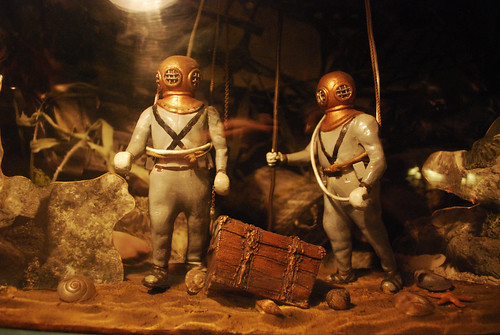
{Photo by rocketlass.}
Almost exactly a year ago, I read my first Charles Portis novel, The Dog of the South, and I wrote that it was
crammed from start to finish with oddballs, dropouts, and failures, all of whom cling to this world all the more intensely for the fact that they can't quite figure out what to do with it.I followed that with True Grit, which is also a wonderful book, if a bit less unhinged: whereas True Grit locates the reader so squarely in Mattie's point of view that we feel as if her own off-kilter worldview colors everything she sees (and, in the case of the book's strange cadences and vocabulary, everything she hears), in The Dog of the South, the crazy is general, manifest in everyone and everything found in our too-busy, too-atomistic, too-stimulated world. Being a fan of oddity, I preferred (and laughed more at) the latter.
Well, The Dog of the South has nothing on Masters of Atlantis (1985). Technically about the members of a secret society and the tribulations they face in trying to gain esoteric knowledge, recruit new members, and keep the organization afloat through most of the twentieth century, what it really is is a long succession of one oddball after another offering his own cracked interpretation of the world, nearly all of them incompatible with nearly all the others. In my description of The Dog of the South, I wrote that one character
seems to regard all the world's facts as equally important; though paring them down or assigning importance might reveal hints of a pattern, it's as if he feels an obligation not to discriminate, as if each and every detail deserves his full careIn Masters of Atlantis, it's as if every character is that character, and Portis has taken all the world's facts (and most of its non-facts), spun them around in one of those old wire baskets that were used to select bingo numbers,and drawn them out one by one.
Having already rambled a long time here, I'll give you just the briefest of samples today; expect more later in the week (that can serve as a warning to those whose taste for weirdness is easily sated). Here's Lamar Jimmerson, leader of the Gnomon Society, reflecting on a woman who has recently moved into the temple in the role of housekeeper/landlady, with the aim of bringing in boarders:
All this, with the best yet to come, the roomers. Soon there would be a pack of coughing drifters bumping around upstairs, alcoholic house painters and clarinet painters, tramping to the bathroom at all hours of the night. Still, to give the woman her due, she had been very decent in offering to mend his clothes and in putting her tiny car at his disposal. She had brought no cats along with her and no miniature dogs. She did not whinny or titter and had not, so far, tried to embrace him.Portis has a particular genius for allowing trains of thought to thunder along to their eventual destinations, however side-shunted and off-topic those may be. In their extravagance and detail, the pointless ruminations of his characters bring to mind the elongated, distracting quality of Homeric similes, image that get so caught up in their own terms and concerns that their point of origin is quickly lost.
The next passage is a perfect demonstration. Jimmerson, in addition to leading the Gnomon Society, is in the middle of a quixotic run for the governorship of Indiana:
What could he, Governor Lamar Jimmerson, Master of Gnomons, do for his fellow citizens? One service came immediately to mind. As his first official act he would order the Parks Department to install a guardrail all around the base of Rainbow Falls, with plenty of warning signs. Such an inviting place and yet so treacherous. At this very moment white-haired judges and rumpled old family attorneys were down there losing their footing and crying out as they fell and bruised their buttocks on those cruel green rocks, first slick and now hard. But then downstream a bit, below the cascade, all violence spent, wouldn't there be a limpid pool where older men in prickly blue wool bathing briefs could paddle about unobserved with swim bladders under their arms?I suspect that many of you are now making an expression like the one rocketlass presented when I read her a passage, something my constant laughter left me barely able to do: an eyebrow cocked at an angle perfectly calibrated to express skepticism, bewilderment, and doubts about my sanity in equal measure. And I do understand: I have trouble believing these novels were ever published, let alone that they're still in print; they're just so weird. But for the initiates (and here I am beginning to sound a bit like a Master of Atlantis myself), the pleasures offered by Portis are countless.
Ha, wonderful examples. I avoided Portis for years, knowing only that his best-known book was a John Wayne movie, and that I can't stand John Wayne. Then I read 'Norwood' and 'True Grit' and realised what a sad, deluded fool I had been.
ReplyDeleteI haven't read Dog of the South yet, but Norwood is probably my favorite of those I have read. I liked Masters of Atlantis, though I remember thinking that its humor could have been a bit more robust. If that makes any sense.
ReplyDeletePortis is one of those authors people have recommended to me for a couple of years but who I've so far not taken up. I only know about his because of "True Grit" and sort of imagined a Louis Lamouresque writer. I see I've been wildly mistaken; I'll have to go out and pick up some Portis. Tonight.
ReplyDelete